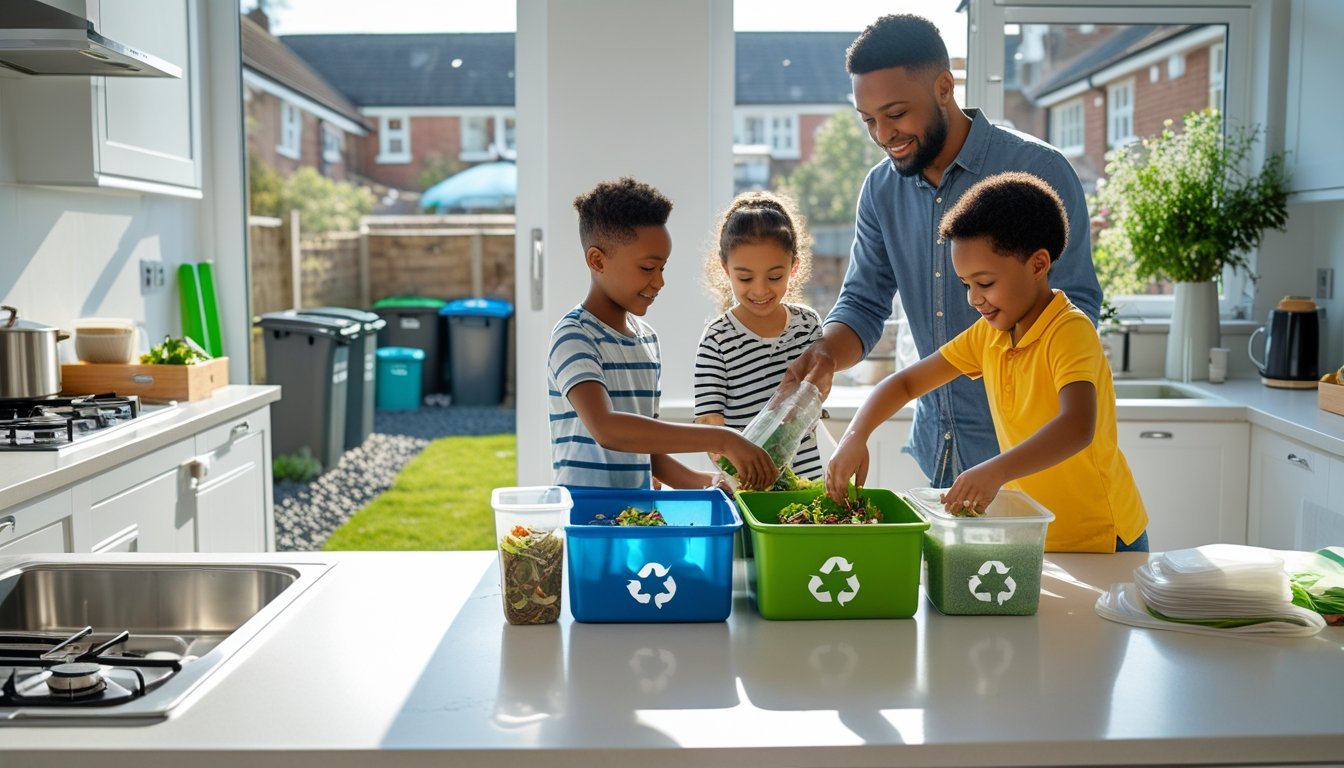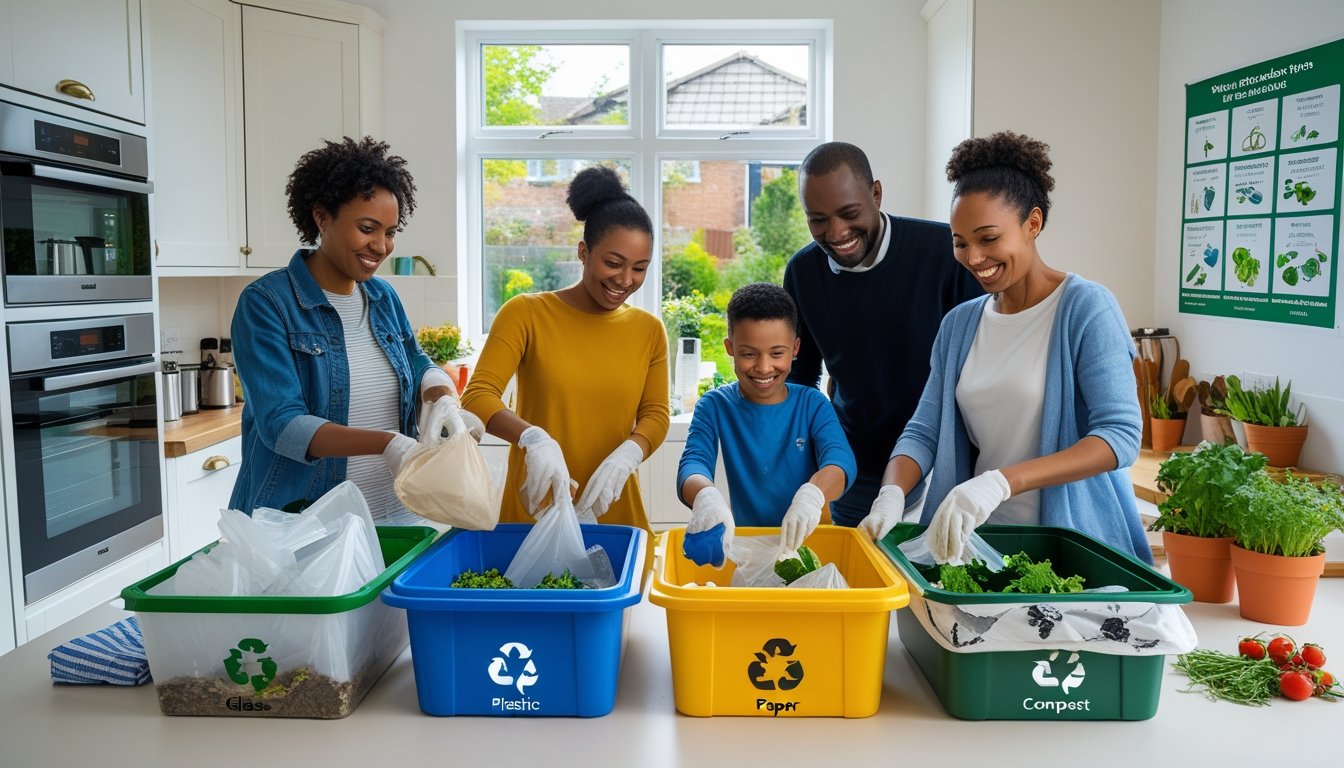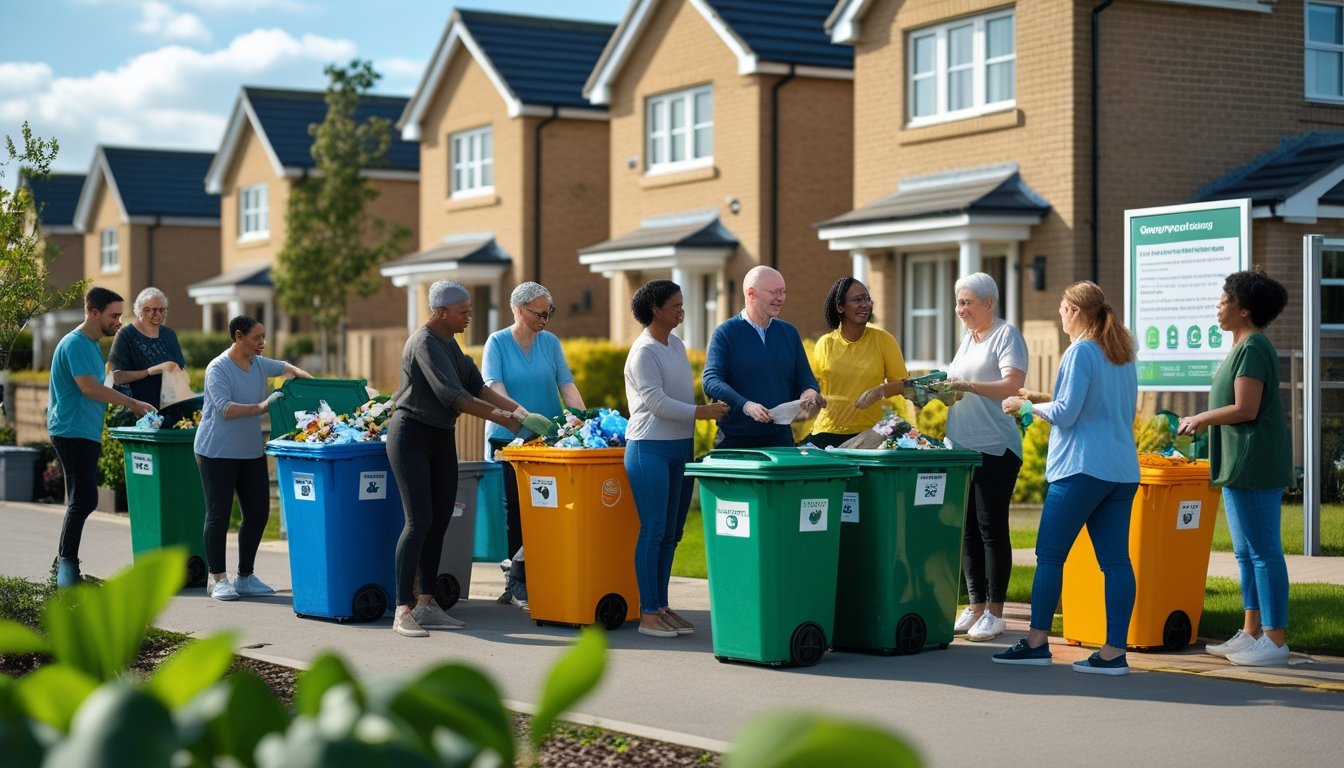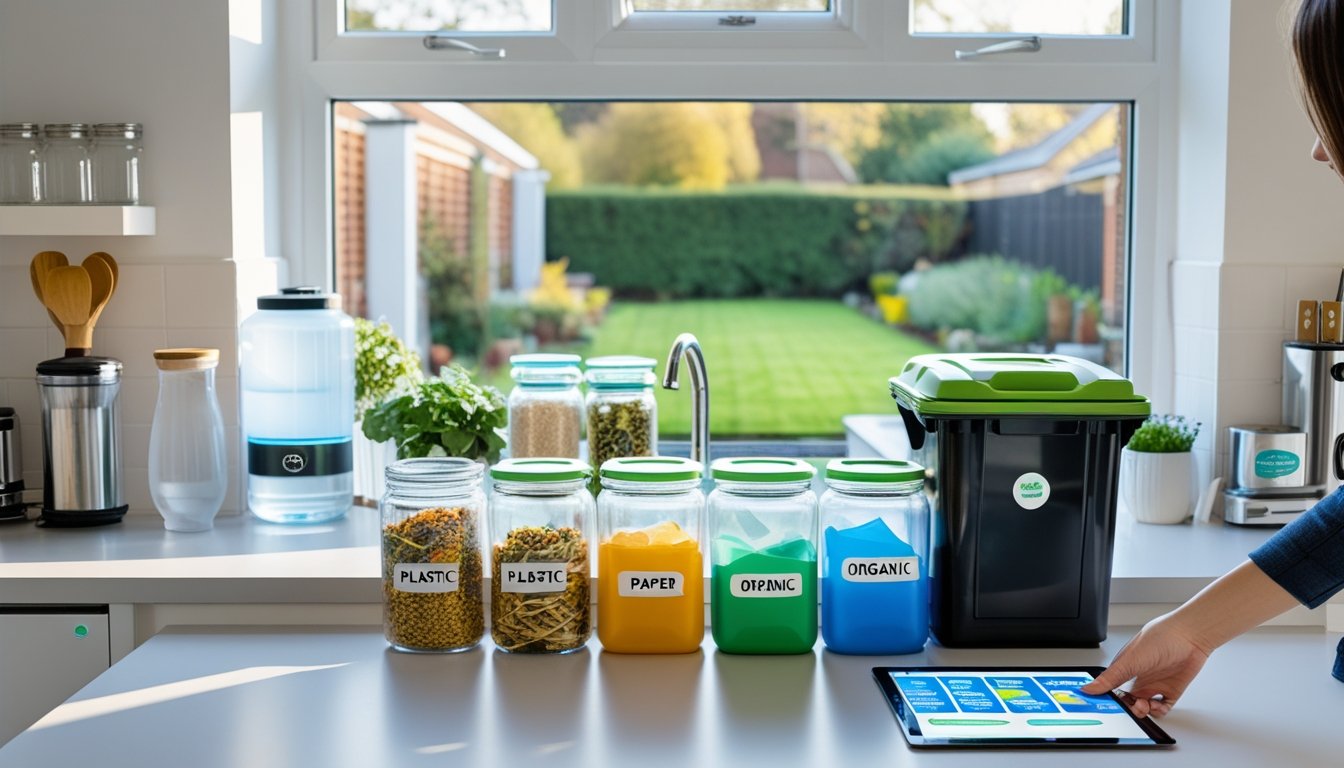Late updated: 19 Aug 2025 13:08
Written by: Eleanor Hartman
Innovative Waste Reduction Strategies For UK Homes: Practical Approaches To Sustainability
Reducing waste in our homes not only helps the environment but also fosters healthier living spaces. In the UK, innovative strategies are at the forefront of tackling household waste efficiently. From composting organic materials to embracing upcycling, there are numerous creative ways to minimise our impact.

Homeowners can implement practical waste reduction methods such as supporting local swap events, using homemade cleaning solutions, and participating in recycling programmes. These initiatives not only cut down on waste but also save money and resources, which are pivotal in shaping a sustainable lifestyle.
The shift towards living sustainably is visible across many UK communities. As individuals and communities embrace zero-waste lifestyles, they contribute to a collective effort to safeguard our planet. Through innovative techniques and community-driven initiatives, we can all play a part in reducing waste and enhancing our daily lives.
Key Takeaways
- Innovative waste strategies reduce home waste efficiently.
- Practical tactics involve composting and recycling.
- Community initiatives enhance sustainable living.
Innovative Waste Reduction Strategies for UK Homes

In the UK, embracing innovative waste reduction strategies is essential for paving the way towards enhanced sustainability. Key approaches include integrating circular economy principles, implementing efficient recycling methods, and utilising digital tools for better waste management.
Adopting Circular Economy Principles at Home
Circular economy principles focus on minimising waste and maintaining the value of products and materials for as long as possible. In our homes, this means purchasing durable goods, repairing rather than replacing, and supporting brands that offer take-back schemes for their products.
Creating a miniature circular economy within our households can be achieved by favouring reusable over disposable items. Additionally, composting organic waste transforms what would be discarded into a valuable resource for gardens. DIY projects using recyclable materials further enhance resourcefulness and creativity, making them worthwhile endeavours.
Implementing Smart Separation and Recycling Solutions
Effective recycling starts with separating waste correctly. In our homes, this can be accomplished by setting up clear and accessible sorting stations for different materials such as plastics, glass, metals, and paper. Educating families on recycling symbols and their meanings ensures everyone contributes to efficient disposal practices.
Partnering with local councils or community initiatives can improve our access to recycling services and insights into specific local requirements. Furthermore, investing in compact and organised storage solutions for recyclables, especially in urban settings, helps overcome space constraints and maintains cleanliness and order.
Leveraging Digital Tools for Household Waste Tracking
Technology plays a pivotal role in modern waste management. Apps designed for tracking waste production provide valuable insights into our consumption patterns. These tools help us make informed decisions to reduce waste generation effectively.
Digital platforms may offer services such as reminders for waste collection days or tips for reducing waste through sustainable practices. Participating in online communities or forums fosters a sense of collective responsibility and shared learning, making waste reduction efforts more practical and engaging for everyone involved.
Practical Techniques and Community Initiatives

Our focus on waste management involves implementing practical techniques within households and actively participating in community initiatives. Through strategic planning, local collaboration, and embracing urban initiatives, we have the tools to significantly reduce our waste footprint.
Reducing Food Waste with Smart Planning
Reducing food waste starts with smart planning and mindful purchasing. It’s crucial to plan meals in advance, allowing us to buy only what is needed. We should create weekly menus and shopping lists, focusing on versatile ingredients that can be used across multiple meals. This ensures we minimise the risk of spoilage and unnecessary waste.
Portion control is another effective method. By understanding the right serving sizes, we can prevent excess food from ending up as waste. Furthermore, getting creative with leftovers allows us to transform them into new meals, maximising their use. For example, using yesterday's roast chicken in today’s sandwiches.
Finally, proper food storage techniques are essential. By using airtight containers and the right refrigeration practices, we can extend the shelf life of our produce. Employing these strategies helps us tackle the challenges of food waste directly at home.
Participating in Local Repair and Share Schemes
Engaging in local repair and share schemes presents an opportunity to extend the lifecycle of household items. Communities across the UK host repair cafés and share libraries. These initiatives allow us to borrow seldom-used items instead of purchasing them, such as power tools or party equipment.
Our local repair cafes bridge knowledge gaps by connecting us with skilled volunteers who can assist in mending broken electronics, clothes, and furniture. This not only reduces waste but also encourages community interaction and learning.
Participation in share schemes reduces unnecessary consumption, promoting a sense of communal resource stewardship. For example, tool libraries enable individuals to use various equipment without the need for ownership. This shift towards shared resources conserves materials and supports sustainable living in our neighbourhoods.
Harnessing Urban Projects for Household Resource Recovery
Urban projects present exciting avenues for household resource recovery. In cities, community composting programmes empower us to recycle organic waste efficiently. Residents contribute kitchen scraps to communal compost bins, transforming potential waste into rich compost for community gardens.
Many urban areas are also embracing waste-to-energy initiatives. These projects convert non-recyclable waste into usable energy, which can power homes and reduce landfill contributions. Emphasising this approach fosters energy sustainability and resource recovery.
Additionally, urban recycling schemes enhance waste management. By integrating innovative methods like mobile recycling units, cities are making it more convenient for us to participate in recycling efforts. These projects underline our role in a circular economy and highlight the transformative potential of urban community initiatives.
Frequently Asked Questions

Our exploration of waste reduction strategies in UK homes addresses various aspects from effective methods to policy impacts and recent innovative strategies.
What are the most effective methods for reducing household waste in the UK?
In the UK, some of the most effective methods for reducing household waste include adopting a zero-waste lifestyle, using the 5 R's principle (Refuse, Reduce, Reuse, Recycle, Rot), and practising smart recycling. Residents can also implement innovative composting techniques and participate in item swap events to minimise waste.
How has the National Waste Strategy impacted waste reduction in UK homes?
The National Waste Strategy has provided a comprehensive framework for improving waste management across the UK. It has encouraged recycling and reduction efforts by setting ambitious targets and supporting local initiatives. Household participation has seen increased recycling rates and awareness of sustainable living practices.
What role do UK homeowners play in the Waste and Resources Action Programme?
UK homeowners significantly contribute to the Waste and Resources Action Programme (WRAP) by following guidelines and adopting responsible waste practices. They actively participate in recycling schemes, reduce waste production, and engage with community programmes designed to promote sustainability and resource conservation.
What statistics illustrate the effectiveness of waste reduction practices in British homes?
Various statistics show the positive impact of waste reduction practices in British homes. Recycling rates have steadily improved, with millions of tonnes of waste being diverted from landfills each year. The adoption of circular economy principles has further led to noticeable reductions in overall household waste production.
How significant is domestic waste incineration in the UK's overall waste management?
Domestic waste incineration plays a considerable role in the UK's waste management system. It provides an alternative to landfill, generating energy from waste. The process is designed to mitigate greenhouse gas emissions by converting waste into a resource, contributing to the country's goal of reducing landfill dependency.
What innovative waste management strategies have emerged in the UK market recently?
Recently, several innovative strategies have emerged in the UK market. These include transforming plastic waste into building materials like bricks and roads. The development of flexible plastic recycling technologies and advanced sorting systems in waste facilities have also been notable advancements in sustainable waste management.